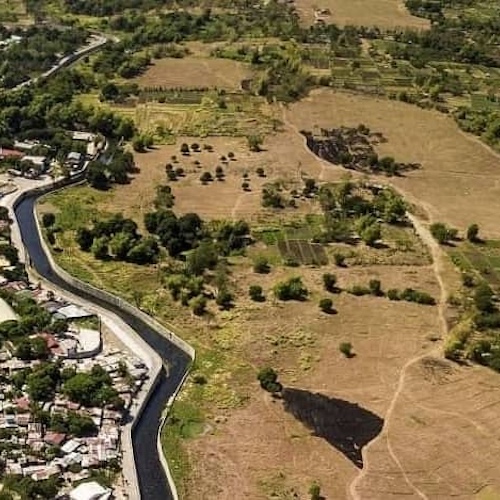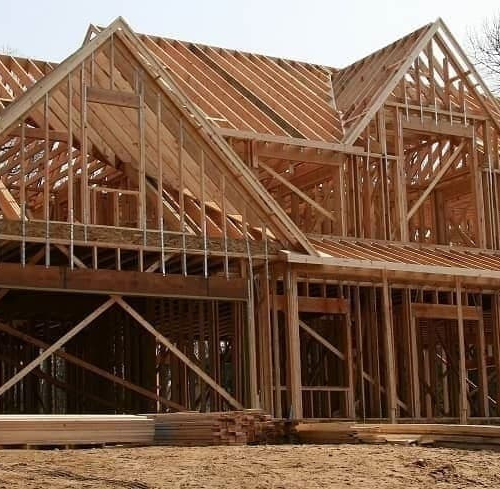Buying undeveloped land: Pros, cons, and financing tips
Contributed by Sarah Henseler
Jul 31, 2025
•7-minute read

Owning undeveloped land can feel like holding the blank canvas of your future home in your hands. However, before you dive into construction plans and possibilities, it’s worth taking a step back to understand exactly what raw (undeveloped) land is, how it can be utilized, and what it takes to acquire and develop it.
Taking time to do a little research ahead of time can help ensure your dream is realistic and that the property is a good fit. Here’s a closer look at the process of buying undeveloped land.
What is undeveloped land?
Before we explore the potential benefits and drawbacks of buying undeveloped land, it’s essential to understand what the term means and the potential challenges you may encounter along the way.
Definition and characteristics
Undeveloped land is often referred to as raw land. This is land with no structures or utilities, and it may not even have road access. Think of undeveloped land as a blank slate, ready for various potential uses.
This means you’ll have to manage building road access and driveways, connecting utilities for power, water, natural gas, and internet, and navigating the complex world of zoning and construction approval. Topography and proximity to existing development can influence the cost and difficulty of developing.
The land may already be cleared and ready to build on, or it could be a forested lot, rural acreage, or used as farmland.
Common uses for raw land
Typically, undeveloped land is in rural areas, found off county roads, and could be the place to build your dream home. It can be used for many other purposes as well, including:
- Building a custom home
- Recreational use
- Renting to farmers or recreational vehicle dwellers
- Using it as storage or for parking
- Working a side hustle
- Selling the land at the right price
Raw land is incredibly flexible. However, legal use is dependent on local zoning regulations. Check with the county and city before buying to ensure you don’t run into any unpleasant surprises that could restrict your plans.
What are the pros of buying undeveloped land?
There are many benefits to buying undeveloped land rather than buying an existing home, or looking at rural areas for buying a cottage or cabin. Here are a few to consider.
Flexibility and customization
Undeveloped land is a completely blank slate. That means you can choose to use it however you want, within local zoning laws, and customize your build from the ground up to your exact specifications. As nothing is on the property, you won’t have to debate features of a home you don’t like.
Lower purchase price
Note that undeveloped land often costs significantly less than a property with an existing home. When you look at the cost per acre, it may feel like a bargain. As you get into less in-demand areas outside of big cities, you may also find much lower prices.
Low maintenance costs
Buying real estate property without any buildings means there’s less to maintain. You don’t have to worry about broken appliances, broken HVAC systems, plumbing problems, or a leaky roof. While you’ll still need to keep up with property taxes and insurance, you’ll have very little, if any, ongoing maintenance.
Less competition
When it comes to buyer competition, it’s often easier to purchase undeveloped land than a traditional single-family home. Many buyers want something they can move into right away. They don’t want to deal with the stress that may come with building a home, and they may not want to deal with the challenges of a new build. Many can’t wait that long to move in, either. However, buying land and avoiding the competition could be a good move if you have the time to wait.
Potential return on investment
Land is finite. There’s only so much in existence, and nobody is making more of it. As the population grows and space becomes more limited, the price of land can increase over time. Undeveloped land has the potential to be a high-return investment property.
What are the cons of buying undeveloped land?
Undeveloped land is often viewed as having significant appreciation value due to limited supply and growing demand. However, you may still have difficulty getting financing. Before you invest, consider the pros and cons of buying undeveloped land, the costs associated with building on the land, and how you’ll go about financing your purchase.
Lack of infrastructure
Buying a property with no access to water, sewer, electricity, or roads can be challenging. You’ll need to build a road and install or connect utilities, and that can be a costly and time-consuming endeavor.
Financing difficulties
Many lenders don’t offer traditional mortgage loans for raw land. You’ll likely need to make a much larger down payment and pay higher interest rates than single-family homes. Working with experienced lenders for undeveloped land can help facilitate a smooth purchase process.
Zoning and permitting challenges
Zoning laws dictate how certain pieces of land can be used. They can vary by location and may ultimately limit your intended purpose for the land. It could be restricted to agriculture, residential only, or to protect wildlife. Before buying land, do your research on the area’s zoning laws by visiting the Department of City Planning or another local government office. You may also be able to find info on the zoning laws at the library or on the city’s website.
Permitting costs
Permits demonstrate approval from the local government to build or complete a project on a property. You’ll likely need several permits to build on undeveloped land. These commonly include septic, well, driveway, and building permits. Don’t underestimate the cost or time it takes to get permitted. Some cities and counties are easier to work with than others, and local regulations are likely unique.
Easements
An easement allows another person or business the right to use someone else’s property for a specific purpose, such as shared driveways or underground pipes. You’ll want to make sure the property doesn’t have any easements and, if it does, that you’re okay with the access that’s granted and that it won’t interfere with your plans for the property. And if the property is landlocked, you’ll need to make sure you have an easement to gain access. If the property already has an easement for this purpose, ensure you fully understand your rights.
Time
If you plan on building on your raw land, consider your timeline. Unless you’re just looking to go camping, you may not be able to move in or build on the land right away. And it may take longer to build on undeveloped land because you’ll need to prepare the property, gain access, and install utilities.
Costs associated with developing raw land
Of course, the cost of buying and developing land depends on the location, the size of any new homes or structures, the complexity of the layout, and the materials used. If you’re building a home on undeveloped land, additional expenses to plan for may include:
- Clearing and grading the land
- Building an access road
- Environmental testing
- Additional permits
- Utility hookups
When deciding which undeveloped property to purchase for a new home, consider the additional costs associated with building a house on undeveloped land. For example, if the neighborhood has an anti-development sentiment, you may encounter additional challenges.
Costs vary widely based on the size and location of the property. Plan on tens of thousands of dollars in costs and fees.
Financing options for undeveloped land
Not all lenders work with raw land, and many lenders have special rules for financing undeveloped land and building projects. Experienced lenders and real estate agents can guide you through the financing process.
Raw land loans
As the name implies, raw land loans are a special type of mortgage for undeveloped land. Lenders generally consider them riskier than home loans, so you can expect a higher down payment requirement and interest rate than with a conventional mortgage.
Seller financing
If a private landowner is looking to sell, they may also act as the lender. With seller financing, you pay the original owner over time, rather than a bank or other lender. Seller financing can offer more flexible terms, but it’s crucial to have carefully reviewed contracts. You may want to hire a real estate lawyer to help draft the terms and protect your interests.
Government programs
Government programs may be an option for buying commercial land, agricultural property, or rural homebuilding. SBA 504 loans and USDA construction loans are government-backed programs that may offer an easier approval process and lower costs. Rocket Mortgage doesn’t offer these types of loans, but they may be worth exploring when buying land.
How to buy and finance undeveloped land
If you want to buy and finance undeveloped land, whether it’s for a future home or holding as an investment, you’ll want to follow these general steps. Working with an experienced real estate agent is also instrumental in making your purchase of vacant land go smoothly.
1. Do research and due diligence
Once you decide how you want to use the land, you can start scouting land for sale to find a property that will best serve that purpose. Once you find one or more potential parcels, some other important considerations include:
- Easements on the property
- Ability to access a main road and utilities
- Permits required for the land
- Local zoning laws and restrictions on the property
- Cell service
- Amount of time and money needed to prepare the land
- Proximity to other structures or land that could hurt or help land value in the future
Once you’ve done due diligence and think the land can be a good fit for your goals, you can begin more thorough surveys and evaluations to ensure it’s the right choice.
2. Conduct a land survey and environmental tests
While the seller may be honest and have the best intentions, don’t blindly rely on what the seller says. Instead, hire a professional to conduct a thorough property survey. The results will tell you where the property lines are located, if there are any easements and where they are located, and if there are any encroachments on the property. You’ll also want to get environmental tests done to check for contaminants.
Arrange to walk the property and get a feel for the topography and land features you particularly enjoy or dislike.
3. Apply for a land loan
If you need financing to buy undeveloped land, you’ll need to apply for a land loan, specifically a raw land loan. This loan may come with higher interest rates and a significantly larger down payment requirement.
When applying for a land loan, ensure you’re proactive and come prepared with a solid, comprehensive plan for what you’ll do with the land to demonstrate the investment potential to the lender. You’ll also want to prepare your financial information, such as tax returns and financial statements, to prove your ability to afford the costs.
4. Understand legal considerations
Before signing purchase and loan documents, double-check any issues, such as access to landlocked lots, unclear title issues, and existing easements. A title company, real estate attorney, and experienced land-buying agent can work together as your advisory council to identify and navigate any problems before they become an expensive surprise.
FAQ
Is buying undeveloped land a good investment?
Undeveloped land can be a good investment, but it’s far from guaranteed. Land can appreciate in value and offer more flexibility, but it can be more challenging to sell, and development timelines can be quite lengthy.
What are the typical costs associated with developing raw land?
In addition to buying the property, buying raw land and developing it can include costs such as access roads, utilities, permits, and environmental testing. Costs can vary widely depending on location and terrain. An expert real estate agent can help you understand what you’re getting into before buying.
Are there tax benefits to owning undeveloped land?
Undeveloped land may offer some tax advantages. Those can include property tax deductions and savings on capital gains when reselling, depending on use and location. When in doubt, working with an experienced tax professional can ensure you maximize benefits while avoiding missteps.
Do I need a real estate agent to buy undeveloped land?
You may be able to buy land without a real estate agent, but it’s strongly recommended to work with a qualified professional. A licensed agent understands state and local real estate laws can help you deal with questions around zoning and easements. They can also spearhead negotiations with sellers, which can lead to significant savings.
Can I live or camp on undeveloped land right away?
You may be able to set up camp on raw land immediately after purchase, but not always. Some areas restrict camping or habitation without prior approval, and such activities may be prohibited by zoning and health codes. You may need permits or access to specific infrastructure before you can stay on the property overnight.
The bottom line: Undeveloped land is a big investment that can have big rewards
If you’re considering buying undeveloped land as an investment or the location of your new home, it’s essential to have a plan in place for the land and how you’ll finance the purchase. Knowing what to expect ahead of the purchase helps you save time and money. If you factor in all costs and all the steps you’ll need to take to purchase, prepare, and use the land, you’re putting yourself on track for land ownership success.
If you’re more interested in purchasing a home that’s already built, get started on the mortgage process today.

Eric Rosenberg
Eric Rosenberg, is a financial writer, speaker, and consultant based in Ventura, California. He holds an undergraduate finance degree, an MBA in finance, and is a Certified Financial Education Instructor (CFEI®). He is an expert in banking, credit cards, investing, cryptocurrency, insurance, real estate, business finance, and financial fraud and security.
He has professional experience as a bank manager and nearly a decade in corporate finance and accounting. His work has appeared in many online publications, including USA Today, Forbes, Time, Business Insider, Nerdwallet, Investopedia, and U.S. News & World Report.
Related resources

7-minute read
Cheapest ways to build a house: 12 tips for affordable home building
Building a home can be a viable option for buyers in a competitive market, but expenses can add up quickly. Discover the cheapest ways to build a house.
Read more
8-minute read
The complete guide to buying land and building a house
Thinking of building a new home on a piece of raw land? Learn how to buy land and build a house the right way, which includes finding the right loan and lend...
Read more

8-minute read
Is it cheaper to build or buy a house? What you need to know
Wondering if it’s cheaper to buy or build a house? Discover the costs of building a house versus buying and which option is more suitable for your fina...
Read more